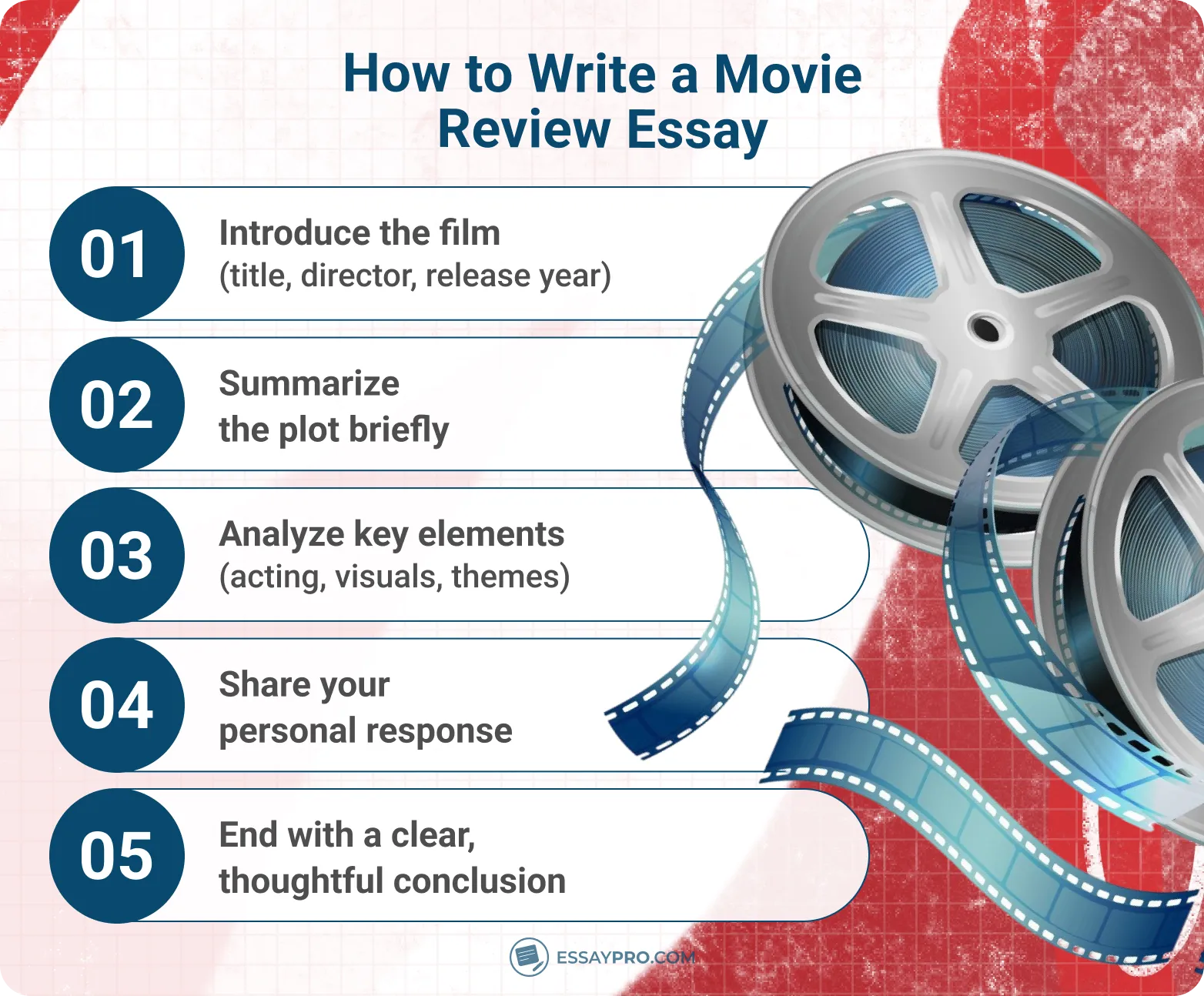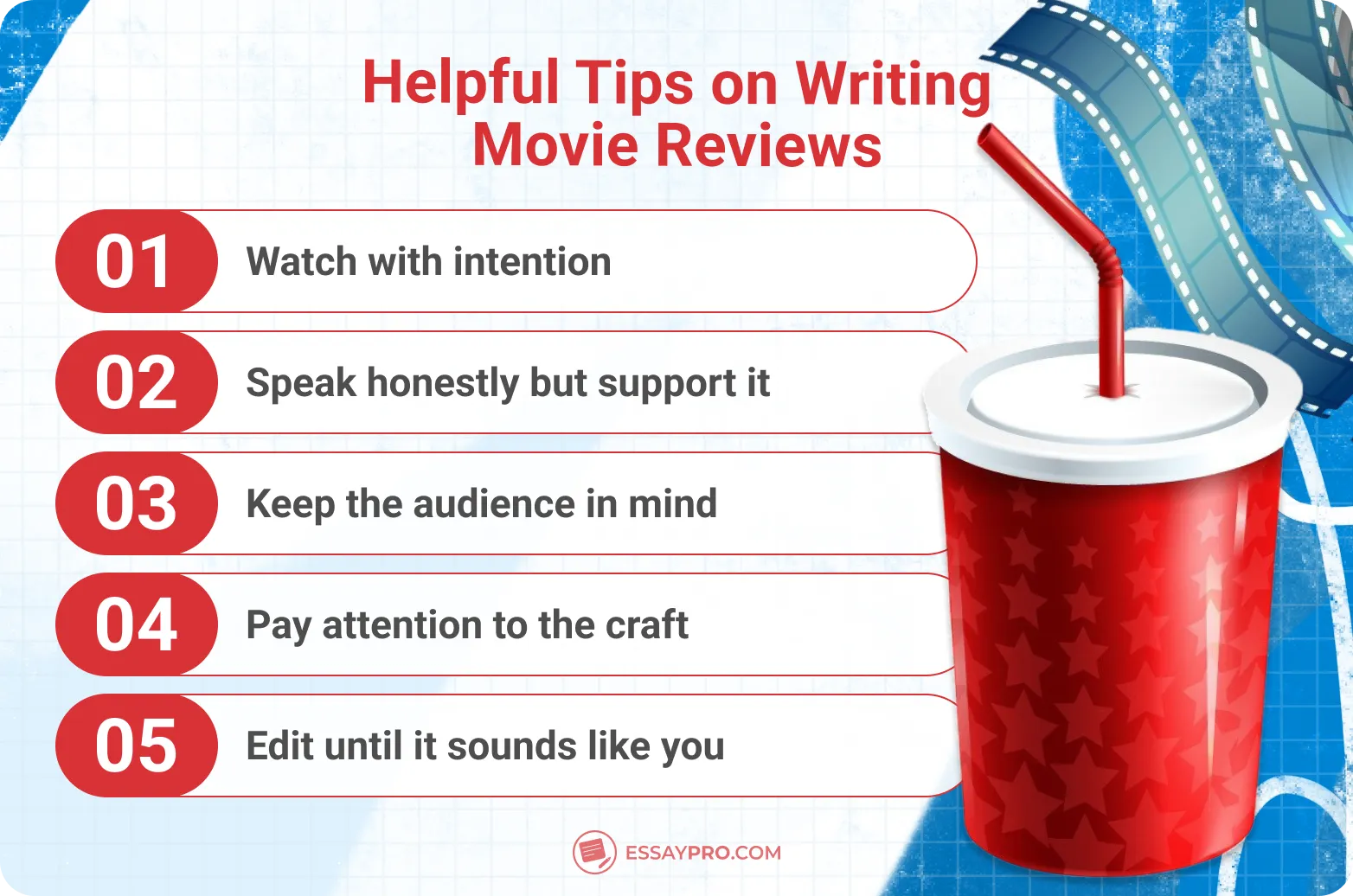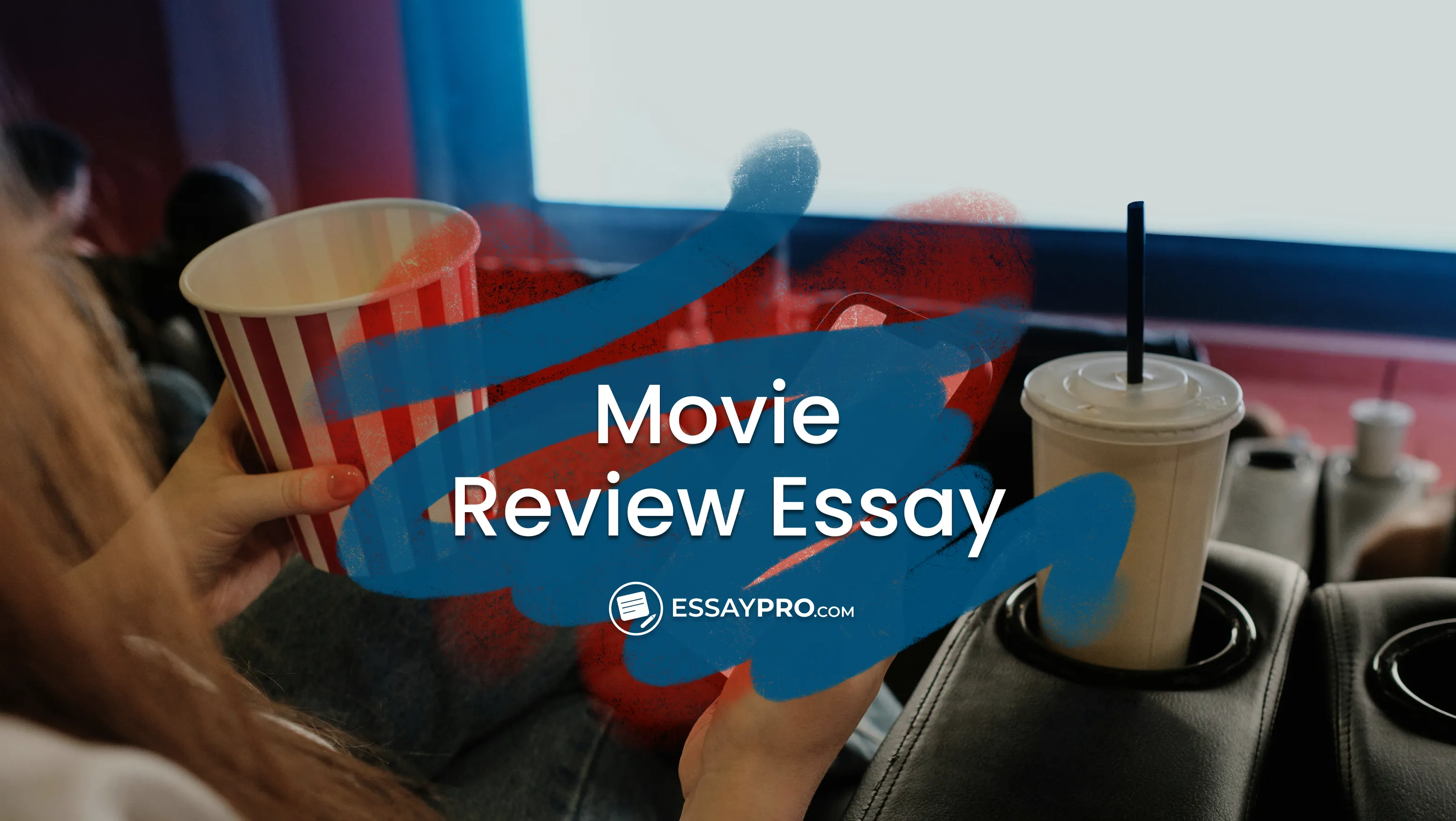Not to sound dramatic, but saying 'it was good, I liked the acting' is a disgrace to over a century of filmmaking. With nearly 700,000 movies in existence and more released every week, the world doesn’t need another review that just scratches the surface.
Each year, thousands of students are asked to write film critiques, but most don’t know where to begin. This article is your shortcut through the chaos. You’ll get a clear breakdown of what a movie review essay actually is, how to write one that’s structured and sharp, and what details professors actually want to see. Plus, we’ve included real examples and a handy review template to make your life easier.
Need help putting your thoughts into words? Simply place an order and say, write my essay for me. Our expert writers will handle the rest carefully, clearly, and always on time.
What Is a Movie Review
A movie review is a written response to a film that balances observation with opinion. It is, by no means, a plot recap or a personal rant you might come across on Letterboxd (although some members take kino very seriously). A movie review essay sits somewhere between art criticism and journalism and examines how a film works technically, emotionally, and thematically.
In a strong movie review essay, you study what the film is doing beneath the surface. Every scene carries choices: how a camera lingers, when silence takes over, why a character reacts in a certain way.
This kind of analysis makes watching a movie an active, intentional process and helps readers engage with film more, encouraging an effort to understand the piece.
Movie Review Purpose
Every film, no matter the genre, invites a response, and a movie review essay is where that response takes place. A review gives you room to notice:
- How the film was built
- How a line was delivered
- How a scene was cut
- How a mood was created without saying a word.
These observations start turning into meaning. Writing a review helps you trace the impact of each creative decision and figure out what stayed with you and why. The purpose goes beyond just reacting. You try to understand the film more clearly and help others see it through a sharper lens.
Parts of a Movie Review
A true movie review doesn’t wander. It has a clear shape. Structure helps the reader follow your thinking, and it helps you organize your reactions into something thoughtful. Most of them follow a loose pattern with four key parts of a movie review: the introduction, the summary, the analysis, and your personal take.
- The introduction: This is where you name the film, mention the director, and give any context the reader might need. A good introduction of movie review additionally hints at your overall opinion, without giving away too much.
- The summary: Next comes the summary. Keep this part short. A few lines to describe the plot are enough. The goal isn’t to retell the movie. It’s to orient your reader.
- The analysis: This is the heart of the piece. Analysis is where you take apart the film’s elements: cinematography, acting, pacing, dialogue, themes, and sound. Every choice you highlight should connect back to what the film is trying to say or how it makes the audience feel.
- Your personal take: Finally, there’s your personal perception. This part brings in your reaction, your taste, and maybe even your background if it’s relevant. You’ve studied the parts, now it’s time to say what they added up to for you. A good movie reviews essay holds both the film’s intent and your honest reaction in the same space.
Writing your first movie review? Check out our community discussion on what movie changed the worldview of the watchers!
How to Write Movie Review Essay Step by Step
Knowing how to write movie review essay means more than describing a film. You're pulling apart what makes it work or what makes it fall. A strong review balances observation with interpretation. It has a clear structure, not to box in your ideas, but to give your thoughts room to land with purpose.
Here’s a step-by-step approach that helps you build a quality review according to our service.

1. Introduction
The introduction of film review establishes the basics. Mention the film’s title, director, release year, and genre. If it’s based on a book or a true story, that’s worth noting too. Then, give a sense of your tone. Will this be a glowing review or a critical one? Set that expectation without giving away your full opinion just yet. A sharp introduction grabs attention, gives the reader footing, and invites them into your perspective.
2. Summary of the Movie Plot
Keep this section super tight. A paragraph is usually enough. Focus on the setup and discuss who the main characters are, what’s at stake, and what kind of story this is. In this part, you’re not walking the reader through every scene. You’re helping them understand the basic arc, so your later analysis has context. Avoid spoilers, and if you must include one, give a heads-up.
3. Analysis of the Movie
Take your time here. This is the central part of your essay. Choose a few key elements that stood out to you, such as performance, direction, writing, cinematography, editing, and score. But don’t try to mention everything, this will only make the review hard to follow. Focus on how certain choices shaped the experience. For example, how a specific camera angle changed the tension in a scene, or how a soundtrack carried emotional weight without being obvious.
This is also where themes come in.
- What ideas does the film explore?
- How well does it deliver them?
A thoughtful film review essay doesn’t just name the elements. It connects them.
4. Personal Perception of the Movie
And now it's time to speak from your own viewing experience. What stayed with you? What bothered you? Where did the film meet your expectations, and where did it go somewhere unexpected? This section brings in your perspective, your preferences, and your voice.
Also, personal doesn’t mean unstructured. Keep your points clear, and tie them back to what you observed in the analysis. Your reaction carries weight when it's grounded in detail.
5. Summing Up
Finally, sum it up and pull everything together. Don’t restate your opinion, reframe it now that you’ve laid out the evidence. A good conclusion shows the reader what to take away from your review. Finish with an image, a final thought, or a question.
No matter the kind of movie review you have to complete, our professional specialists are willing to help you. Directly forward your needs to our research paper service and get it done quickly.


Movie Review Template
Before you dive into writing, it helps to have a structure you can lean on. This template breaks a movie review essay into four key sections. Use the phrases below to guide your thinking and shape your sentences without sounding forced.
Movie Review Examples
Once you know how to review a movie and learn the most valuable tips to handle this assignment, it is time to look at some movie review examples to get you on the right track.
Check out the following pieces by our service to see which of these movie review essay examples you might want to keep at hand when working on your own assignment:
Helpful Tips on Writing Movie Reviews
Writing a thoughtful movie review essay takes more than simply stating whether a film was good or bad. These tips can help turn scattered thoughts into something structured, original, and worth reading.

- Watch with intention more than once, if needed: One viewing gives you a first impression. A second helps you notice the choices behind it. Watch closely. Look for what changes the tone of a scene or shifts your reaction without explanation. Good reviews come from careful observation.
- Speak honestly but back it up: It is easy to say a film was boring or brilliant. What matters is why. Be specific. Talk about the writing, the rhythm, the atmosphere. Let your opinions lead the way, but always support them with something the reader can see, hear, or feel.
- Keep the audience in mind: Writing for classmates? Posting online? Submitting for a publication? Who you are writing for shapes how you explain things. Some readers need a background. Others want a deeper analysis. Know who they are before you begin.
- Pay attention to the craft: A performance might carry the weight of a film or fall flat. The cinematography might tell a story in silence. Good reviews name the people behind these choices: the director, the actors, and the editors. Their work is the reason the film feels the way it does.
- Edit until it reflects your voice: No first draft is final. Reread. Cut what sounds vague. Rewrite what feels thin. A strong film review essay does not try to sound like someone else. It sounds like you are thinking carefully and writing clearly.
Final Thoughts
A good movie review essay does more than react to a film. It reflects on it. It pays attention to the choices behind every frame and considers what those choices add up to. Whether the story was slow, stunning, confusing, or unforgettable, the goal is the same: to understand what the film tried to do, and to say something real about how it succeeded or why it did not. Keep watching carefully and writing honestly.
If you ever need writing support or a second opinion, EssayPro is here to help. We’ve got your back if you need a little additional push with movie review examples or even if it's simply coming up with a catchy essay title.
FAQs
How to Write a Movie Review Example?
Start with a clear introduction that names the film and sets your tone. Add a brief summary of the plot, then move into your analysis. Focus on direction, acting, visuals, and themes. Finalize with a personal response and a conclusion.
What Is the Format of a Movie Review?
Most reviews follow this structure: introduction, plot summary, detailed analysis, personal reflection, and conclusion.
How Do You Start a Good Movie Review?
Begin with something specific, such as an image, a moment, or a feeling. Then introduce the title, director, and basic context.

Adam Jason
is an expert in nursing and healthcare, with a strong background in history, law, and literature. Holding advanced degrees in nursing and public health, his analytical approach and comprehensive knowledge help students navigate complex topics. On EssayPro blog, Adam provides insightful articles on everything from historical analysis to the intricacies of healthcare policies. In his downtime, he enjoys historical documentaries and volunteering at local clinics.
- Duke University Thompson Writing Program. (n.d.). Film review. https://twp.duke.edu/sites/twp.duke.edu/files/file-attachments/film-review-1.original.pdf
- New York Film Academy. (n.d.). 9 tips for writing a film review. https://www.nyfa.edu/student-resources/9-tips-for-writing-a-film-review/






